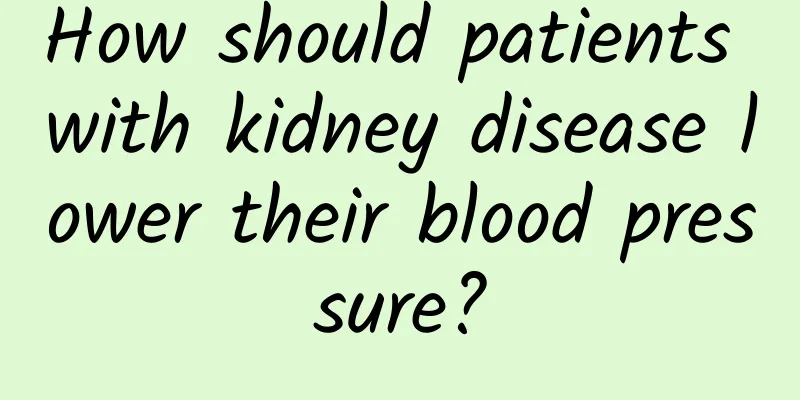How should patients with kidney disease lower their blood pressure?

|
Renal hypertension is one of the common complications of chronic kidney disease, and hypertension is also one of the important factors affecting the prognosis of patients with kidney disease. Therefore, it is very important for patients with kidney disease to control blood pressure. Antihypertensive treatment for patients with kidney disease mainly includes non-drug treatment and drug treatment. Non-drug treatment mainly aims to change unhealthy lifestyles, thereby reducing blood pressure to a certain extent, and mainly includes the following aspects. (1) Low-salt diet: The sodium salt (sodium chloride) intake of non-dialysis patients is 5-6 g/day, and the sodium salt intake of dialysis patients is less than 5 g/day. (2) Control weight: Maintain a healthy weight, avoid being underweight or obese, and keep the body mass index between 20 and 24 kg/m2. (3) Appropriate exercise: Non-dialysis patients should exercise five times a week for at least 30 minutes each time, provided their cardiovascular condition and overall tolerance are met; hemodialysis and peritoneal dialysis patients can exercise as much as they can tolerate between dialysis sessions. (4) Dietary diversification: Adjust your diet based on your proteinuria, kidney function, blood potassium, calcium and phosphorus metabolism, and eat an appropriate amount of vegetables and fruits. You can develop a diet plan that suits you by consulting a nutritionist. (5) Limit alcohol consumption or avoid drinking alcohol. (6) Quit smoking: Kidney disease patients are strictly prohibited from smoking. (7) Adjust your mental state: If a mental illness is diagnosed, seek treatment as soon as possible. The principles of drug treatment for lowering blood pressure in patients with kidney disease are as follows. (1) During initial treatment, standard antihypertensive drug doses should be used and gradually increased to the tolerated dose. Elderly patients are advised to start with a low dose. (2) Decide whether to use a single drug or a combination of drugs based on blood pressure classification and cardiovascular risk stratification. (3) Long-acting preparations should be given priority. Long-acting drugs that can lower blood pressure for 24 hours should be selected as much as possible. They are not only convenient to take, but can also effectively control blood pressure throughout the day. If medium- or short-acting preparations are used, they should be taken 2 to 3 times a day to achieve stable blood pressure control. (4) Under the guidance and assistance of a physician, patients should develop an individualized treatment plan and choose the most suitable antihypertensive drug based on target organ damage to the heart, brain, and kidneys, as well as whether they have hyperuricemia, hyperkalemia, or volume overload. Antihypertensive treatment for kidney disease patients should be based on "early knowledge, early prevention, early diagnosis, early treatment, and reaching the target". During the antihypertensive treatment, blood pressure should be closely checked. If blood pressure is not well controlled, seek help from a doctor in a timely manner, seek and eliminate factors that affect blood pressure in a timely manner, adjust the antihypertensive treatment plan, and try to keep blood pressure continuously and steadily within the target range. |
<<: Love = 6 bottles of wine? But I still want to fall in love after drinking...
>>: Use day cream during the day and night cream at night? Can I use whatever I want?
Recommend
How to play Go? Basic rules and strategies of Go
In ancient China, there were many names for it, s...
Acupuncture points for menstruation
Menstruation plays an important role in women'...
What are the reasons why women feel irritable?
No matter whether you are a man or a woman, an ad...
Can I eat pears during my period?
Pears are refreshing and have sweet juice, making...
How to treat cervical papilloma
Under normal circumstances, the female reproducti...
How many months of pregnancy is it best to take folic acid
Some expectant mothers know that they must take f...
What causes women's physical exhaustion
What are the culprits that make women tired? Mode...
Saving the environment is saving ourselves
Author: Luo Lili China Rehabilitation Research Ce...
Pain in lower abdomen on the right side after ovulation
Women who have reached sexual maturity will have ...
What is the relationship between the uterus and ovaries?
The uterus is an important reproductive organ in ...
What should I do if my breasts become smaller?
The size of the breasts is mainly affected by the...
Patients with cervical lesions tend to be younger
We all know that women are prone to diseases, but...
What are the symptoms of eclampsia in pregnant women?
Many women will experience eclampsia during pregn...
Is it necessary to wear a belly band for induced labor at 6 months?
For female friends who are pregnant, they should ...
How long is the most appropriate time for abortion and what should be paid attention to?
The reason for the question of how long is the mo...





![[People's Daily x Science Rumor Refutation] What should you pay attention to before and after going home for the Chinese New Year? A set of comics will tell you](/upload/images/67f1c2e215317.webp)



